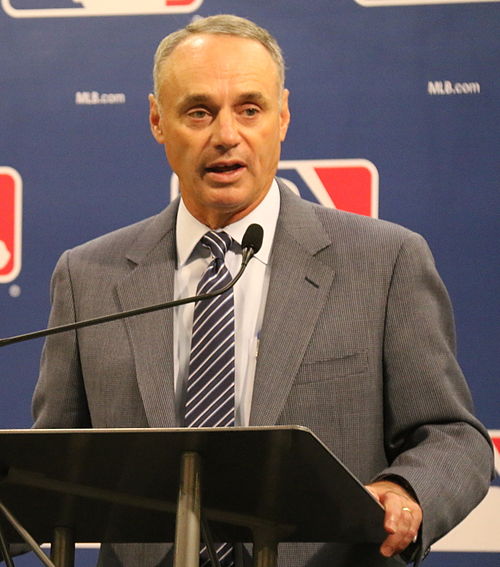
The sport of baseball is called America’s “national pastime” for a reason. It is a sport that links today with America’s historic past, and is a sport that families have been able to enjoy together for over 100 years, in places ranging from New York City all the way to Helena, MT.
But this sport’s place in the national consciousness is in jeopardy, thanks to a current dispute between Major League Baseball players and team owners over its economic future. And while this dispute, and the now resulting cancellation of games has many people to blame, there is one over anyone else who should get most of it, and that is the man at the top.
MLB Commissioner Rob Manfred is viewed by many as a failed leader. And since he took over the sport in 2015 following the retirement of former Commissioner Bud Selig, Manfred’s failure to lead on several big issues facing the sport helped to create the conditions that resulted in the acrimonious negotiations between the team owners and their players over the past several days that ended yesterday with no deal.
On the issue of the cheating scandal involving the Houston Astros and whether that cheating helped them win the World Series in 2017, many fans believed he didn’t go far enough in his discipline of the team over that matter. That scandal continues to linger in the minds of fans to this day, helping to instill concern about the game’s integrity.
Another issue that has struck at the core of that integrity has been the continuing fight the sport has waged against so-called “performance-enhancing drugs,” and their impact on the game. Again, this commissioner has, in the eyes of some, not gone far enough to address this issue, and again, that has helped to cast doubt on the integrity of the game.
But it is regarding issues directly affecting the economics and growth of this game where he appears to have really failed, and it is these economic issues which ultimately are at the heart of the current dispute. Manfred led the effort during the pandemic to reduce the size of minor league baseball, axing affiliated professional baseball teams from smaller communities all over the country, cities such as Grand Junction, CO, Pulaski, VA, Albany, NY, or Billings, MT, replacing those squads with either collegiate summer teams or independent professional teams. And while many of these cities get to still see baseball, there is a different vibe when it’s a minor league game as opposed to college summer leagues or independent ball. It’s an effort that led to at least one lawsuit, and now the commissioner is at it again, trying to cut the size of the remaining teams as part of the current discussions.
These reductions to minor league baseball were made as a result of revelations about pay and working conditions of the minor league players, but it seems that instead of doing the right thing, team owners and the commissioner instead are looking to reduce these teams, impacting overall player development and also reducing the opportunities for homegrown players to get a chance to live their dreams as big-league ballplayers.
Then there’s the issue of expansion, or the lack thereof. From 1977-1998, baseball expanded by six teams – the Seattle Mariners, Toronto Blue Jays, Colorado Rockies, Florida (now Miami) Marlins, Arizona Diamondbacks and Tampa Bay Rays. Since 1998, though, there has been no expansion. So nothing in the past 24 years after having expanded by six clubs in the previous 21. Why? Well, because this commissioner has chosen to not put his foot down with team and government officials in both Tampa Bay and also in Oakland, CA, about stadium issues in both of those cities. The Rays and Oakland Athletics have languished in poor stadium situations in their respective cities for many years now – and in Oakland’s case, player safety has been jeopardized, as evidenced by this 2013 incident involving raw sewage spilling into the dugouts during a rain delay at an A’s game and resulting overflow of the sewer system in the stadium. And in both cities, government and business leaders have not taken the issue seriously, in Tampa’s case resulting in their team seeking to share home games with the Canadian city of Montreal, a plan rightly shot down by this commissioner or in Oakland’s case, exploring relocation to Las Vegas.
But that’s all Manfred has done on either of these issues. Otherwise, he has sat on his hands and done next to nothing. And that lack of action has prevented baseball from expanding and realizing the resulting revenue from expansion fees. Were the sport to expand by four-six teams in the coming years, to cities such as Las Vegas, Portland, Orlando, Nashville, the San Antonio-Austin, TX area or Charlotte, NC, based on current expansion fees in other sports, baseball could see in the neighborhood of $10-15 billion to be shared by other teams. And all of these cities we mention here are cities that have grown sufficiently enough over the years that they could successfully handle a pro baseball team. So the sport could see way more sustained revenue coming from some of those cities, helping to improve the economic climate for teams and improve it for players also.
Instead, we have what we have today, and that is a sport, that instead of working to identify new revenue, is trying to squeeze as much of it out of what’s currently there, and doing so at the expense of both players and fans. Players may not be entirely blameless either – a lot of guys are making what many would call excessive salaries to play a “kid’s game” – but this dispute is more about the lack of vision from the owners and the lack of leadership from a commissioner which threatens to severely damage, if not outright destroy, this sport here in the United States.